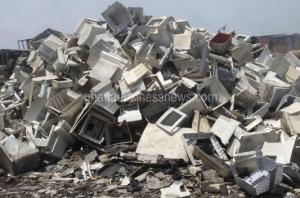As Ghana law lags, new report says only a third of Europe’s e-waste properly disposed

Ghana has been described as the e-waste dump of the world. The country got onto the global map with Agbogbloshie said to be the world’s most polluted spot. But the country is slow in directly confronting the e-waste menace before it gets out of hand.
In 2008, the Greenpeace did a lab test of the soil and water at Agbogbloshie, and the results showed that the soil in the area contained toxic chemicals at levels a 100 times more than World Health Orgaisation (WHO) allowable limits.
The draft E-waste Bill had been expected to be put before Cabinet since November 2013, but no word has been heard about it since.
A new report released today August 30, 2015 by the United Nations and INTERPOL says only a third of Europe’s electronic waste is properly recycled, with vast numbers of cellphones, computers and televisions illegally traded or dumped.
The 56-page report titled, “Countering Waste Electrical and Electronic Equipment Illegal Trade” states that Sweden and Norway were close to European targets of collecting and recycling 85 percent of all electrical and electronic waste, at the top of a ranking in which Romania, Spain and Cyprus were bottom with less than 20 per cent.
The 35 per cent, the report indicates, amounts to 3.3 million tonnes of 9.5 million tonnes of used but still functioning and waste electronics and electrical equipment discarded by companies and consumers in 2012 wound up in official collection and recycling systems.
The other discarded electronics, according to the report, some 6.2 million tonnes in all – was either exported, recycled under non-compliant conditions or simply thrown in waste bins.
The study estimates that 1.3 million tonnes of discarded electronics departed the EU in undocumented mixed exports, of which an estimated 30 per cent, that is about 400,000 tonnes was electronic waste; and 70 per cent functioning equipment.
It notes that more than 10 times the 400,000 tonnes of e-waste exported – some 4.7 million tonnes – was wrongfully mismanaged or illegally traded within Europe itself.
The research found that even in the few EU member states with robust, effective reporting systems, monitoring of de-pollution efforts and up-to-standard treatment conditions are not always securely in place.
While Ghana has been cited as a major e-waste destination for Europe, the level of dumping and the classification of the Agbogloshie site as the most polluted are in dispute.
The only scientifically produced report on e-waste in Ghana published in 2011 found that 171,000 tons of e-waste reaches the country’s informal recycling sector, adding that the amount of material that reaches the formal recycling sector accounted only for 0.2%.
The report on Ghana, by Green Ad, a Ghanaian NGO, the Environmental Protection Agency (EPA) of Ghana and the Swiss Federal Laboratories for Materials Testing and Research (EMPA) notes that, “there are a number of laws and regulations that have some relevance to the control and management of hazardous wastes, including e-waste, “but they do not address the dangers posed to humans and the environment from such wastes.”
Ghana also has unrestricted and unregulated import regime for second hand electronics and electrical items, the report established.
It is known that electronics waste or e-waste contains a dangerous cocktail of poisonous chemicals that pose grave dangers to human life and the environment.
E-waste contains heavy metal chemicals such as lead, cadmium, barium, mercury and arsenic which are dangerous both to humans and the environment.
By Emmanuel K. Dogbevi
